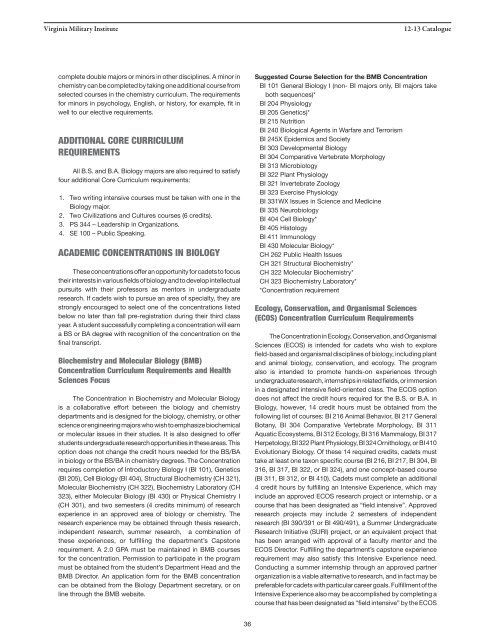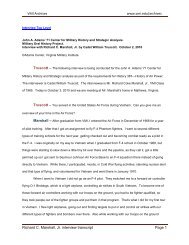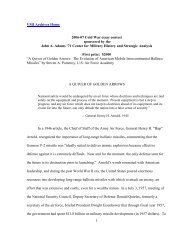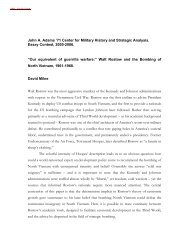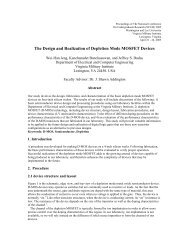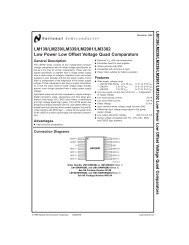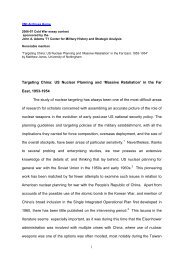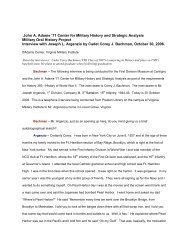Academic Catalog - Virginia Military Institute Admissions
Academic Catalog - Virginia Military Institute Admissions
Academic Catalog - Virginia Military Institute Admissions
You also want an ePaper? Increase the reach of your titles
YUMPU automatically turns print PDFs into web optimized ePapers that Google loves.
<strong>Virginia</strong> <strong>Military</strong> <strong>Institute</strong><br />
12-13 <strong>Catalog</strong>ue<br />
complete double majors or minors in other disciplines. A minor in<br />
chemistry can be completed by taking one additional course from<br />
selected courses in the chemistry curriculum. The requirements<br />
for minors in psychology, English, or history, for example, fit in<br />
well to our elective requirements.<br />
Additional Core Curriculum<br />
Requirements<br />
All B.S. and B.A. Biology majors are also required to satisfy<br />
four additional Core Curriculum requirements:<br />
1. Two writing intensive courses must be taken with one in the<br />
Biology major.<br />
2. Two Civilizations and Cultures courses (6 credits).<br />
3. PS 344 – Leadership in Organizations.<br />
4. SE 100 – Public Speaking.<br />
<strong>Academic</strong> Concentrations in Biology<br />
These concentrations offer an opportunity for cadets to focus<br />
their interests in various fields of biology and to develop intellectual<br />
pursuits with their professors as mentors in undergraduate<br />
research. If cadets wish to pursue an area of specialty, they are<br />
strongly encouraged to select one of the concentrations listed<br />
below no later than fall pre-registration during their third class<br />
year. A student successfully completing a concentration will earn<br />
a BS or BA degree with recognition of the concentration on the<br />
final transcript.<br />
Biochemistry and Molecular Biology (BMB)<br />
Concentration Curriculum Requirements and Health<br />
Sciences Focus<br />
The Concentration in Biochemistry and Molecular Biology<br />
is a collaborative effort between the biology and chemistry<br />
departments and is designed for the biology, chemistry, or other<br />
science or engineering majors who wish to emphasize biochemical<br />
or molecular issues in their studies. It is also designed to offer<br />
students undergraduate research opportunities in these areas. This<br />
option does not change the credit hours needed for the BS/BA<br />
in biology or the BS/BA in chemistry degrees. The Concentration<br />
requires completion of Introductory Biology I (BI 101), Genetics<br />
(BI 205), Cell Biology (BI 404), Structural Biochemistry (CH 321),<br />
Molecular Biochemistry (CH 322), Biochemistry Laboratory (CH<br />
323), either Molecular Biology (BI 430) or Physical Chemistry I<br />
(CH 301), and two semesters (4 credits minimum) of research<br />
experience in an approved area of biology or chemistry. The<br />
research experience may be obtained through thesis research,<br />
independent research, summer research, a combination of<br />
these experiences, or fulfilling the department’s Capstone<br />
requirement. A 2.0 GPA must be maintained in BMB courses<br />
for the concentration. Permission to participate in the program<br />
must be obtained from the student’s Department Head and the<br />
BMB Director. An application form for the BMB concentration<br />
can be obtained from the Biology Department secretary, or on<br />
line through the BMB website.<br />
Suggested Course Selection for the BMB Concentration<br />
BI 101 General Biology I (non- BI majors only, BI majors take<br />
both sequences)*<br />
BI 204 Physiology<br />
BI 205 Genetics)*<br />
BI 215 Nutrition<br />
BI 240 Biological Agents in Warfare and Terrorism<br />
BI 245X Epidemics and Society<br />
BI 303 Developmental Biology<br />
BI 304 Comparative Vertebrate Morphology<br />
BI 313 Microbiology<br />
BI 322 Plant Physiology<br />
BI 321 Invertebrate Zoology<br />
BI 323 Exercise Physiology<br />
BI 331WX Issues in Science and Medicine<br />
BI 335 Neurobiology<br />
BI 404 Cell Biology*<br />
BI 405 Histology<br />
BI 411 Immunology<br />
BI 430 Molecular Biology*<br />
CH 262 Public Health Issues<br />
CH 321 Structural Biochemistry*<br />
CH 322 Molecular Biochemistry*<br />
CH 323 Biochemistry Laboratory*<br />
*Concentration requirement<br />
Ecology, Conservation, and Organismal Sciences<br />
(ECOS) Concentration Curriculum Requirements<br />
The Concentration in Ecology, Conservation, and Organismal<br />
Sciences (ECOS) is intended for cadets who wish to explore<br />
field-based and organismal disciplines of biology, including plant<br />
and animal biology, conservation, and ecology. The program<br />
also is intended to promote hands-on experiences through<br />
undergraduate research, internships in related fields, or immersion<br />
in a designated intensive field-oriented class. The ECOS option<br />
does not affect the credit hours required for the B.S. or B.A. in<br />
Biology, however, 14 credit hours must be obtained from the<br />
following list of courses: BI 216 Animal Behavior, BI 217 General<br />
Botany, BI 304 Comparative Vertebrate Morphology, BI 311<br />
Aquatic Ecosystems, BI 312 Ecology, BI 316 Mammalogy, BI 317<br />
Herpetology, BI 322 Plant Physiology, BI 324 Ornithology, or BI 410<br />
Evolutionary Biology. Of these 14 required credits, cadets must<br />
take at least one taxon specific course (BI 216, BI 217, BI 304, BI<br />
316, BI 317, BI 322, or BI 324), and one concept-based course<br />
(BI 311, BI 312, or BI 410). Cadets must complete an additional<br />
4 credit hours by fulfilling an Intensive Experience, which may<br />
include an approved ECOS research project or internship, or a<br />
course that has been designated as “field intensive”. Approved<br />
research projects may include 2 semesters of independent<br />
research (BI 390/391 or BI 490/491), a Summer Undergraduate<br />
Research Initiative (SURI) project, or an equivalent project that<br />
has been arranged with approval of a faculty mentor and the<br />
ECOS Director. Fulfilling the department’s capstone experience<br />
requirement may also satisfy this Intensive Experience need.<br />
Conducting a summer internship through an approved partner<br />
organization is a viable alternative to research, and in fact may be<br />
preferable for cadets with particular career goals. Fulfillment of the<br />
Intensive Experience also may be accomplished by completing a<br />
course that has been designated as “field intensive” by the ECOS<br />
36


